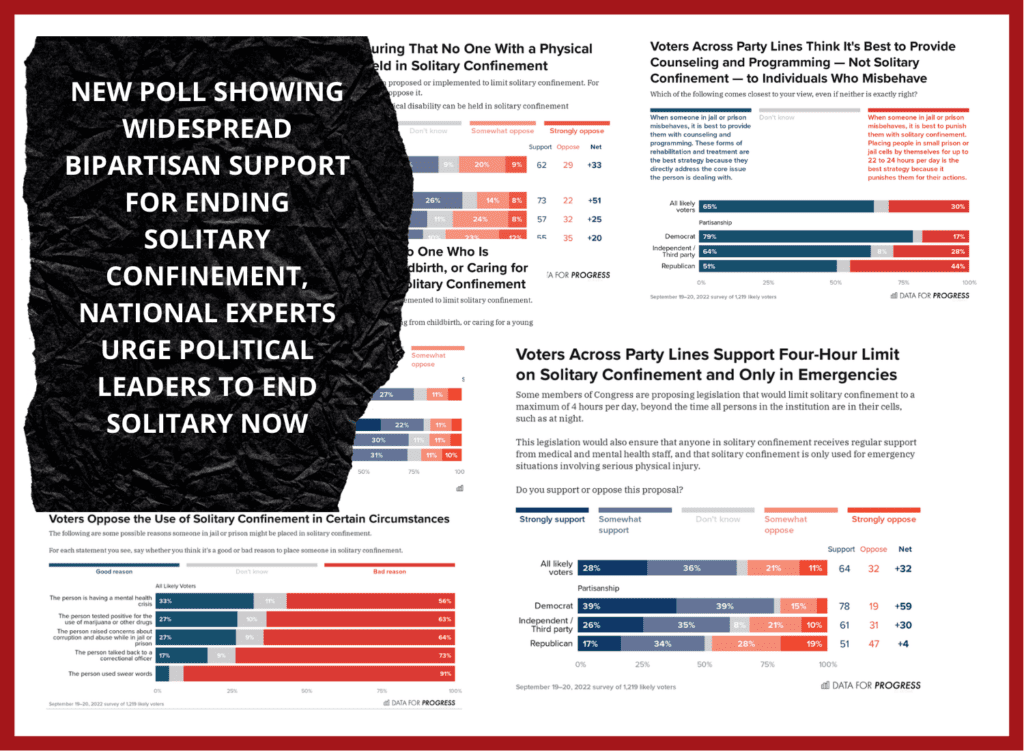Experts Call on President Biden, the U.S. Congress, and State and Local Lawmakers Across the Country to ActC.
WASHINGTON, D.C., November 16, 2022 –
Today, people who survived solitary, impacted family members, the American Civil Liberties Union, Unlock the Box Campaign, and other leading experts call on President Biden, the U.S. Congress, and state and local lawmakers across the country to end solitary confinement in line with Federal Anti-Solitary Taskforce’s Blueprint for Ending Solitary Confinement. Our call for action to end solitary comes in light of new polling data released today by Data for Progress showing widespread bipartisan support for various restrictions on solitary confinement, including banning solitary beyond four hours for purposes of emergency de-escalation – directly in line with the Blueprint’s recommendations. Specifically, voters support this ban on solitary beyond four hours by a +32-point margin, with 78% of Democrats, 61% of Independents, and 51% of Republicans supporting it. Other restrictions on solitary also had widespread bipartisan support, including banning solitary entirely for people with mental health needs (78% support) and other particular groups, ending prolonged solitary for all people in line with international prohibitions on torture and respect for the inherent dignity of all human beings (71% support), ending solitary for currently routine reasons such as talking back to an officer (73% support) or raising complaints (64% support), implementing rehabilitative interventions focused on programs and counseling rather than punishment (65% support), and creating a new office to investigate corruption and mismanagement in U.S. prisons (86% support).
Jessica Sandoval, Director of the Unlock the Box Campaign, said: “While scores of thousands of people continue to be locked in solitary confinement in prisons, jails, immigration detention, and youth facilities, this new poll shows that people across the country overwhelmingly support ending this torture. Now is the moment for lawmakers – from the President on down – to heed this call and act now. Local lawmakers in places like New York City and Washington, D.C. should immediately pass legislation currently before them, Intro. No. 549 and the ERASE Solitary Confinement Act, respectively. The President should issue an executive order fulfilling his pledge to end solitary, and Congress should introduce and pass legislation to stop this torture and utilize proven alternative interventions involving full days of out-of-cell group programming and engagement.”
Johnny Perez, Director of the U.S. Prisons Program at the National Religious Campaign Against Torture, said: “Solitary confinement is tortuous, deadly, and counterproductive to any safety goals. This new polling data shows that current solitary confinement policies are way out of step with public opinion and that there is overwhelming, bipartisan support for taking a stand against this torturous and counterproductive practice. As a growing number of states and localities pursue dramatic policy changes to end or restrict solitary, now is the moment for bold action by the federal government, as well as states and localities, to end the practice once and for all. We are hopeful the Biden-Harris administration, as well as Congress, will follow through with their campaign promise to end solitary by any name and in all forms.”
Tammie Gregg, Director of the American Civil Liberties Union’s Stop Solitary Campaign, said: “As this new polling data reveals, people all across the country and across the political spectrum do not believe in solitary confinement and are urging change. Solitary confinement is a torturous practice that causes immense suffering and severe damage, while also worsening safety for everyone. It should have no place in our society and must be ended immediately. The Blueprint for Ending Solitary Confinement provides a roadmap for how the President, Congress, and state and local lawmakers can and must end solitary confinement in a real and meaningful way while fostering engagement- and program-based interventions proven to be much more effective at improving safety.”
BACKGROUND:
Solitary confinement is torture. It is deadly. It worsens safety for everyone. Solitary is predominantly inflicted on Black and Latinx people. Solitary damages and destroys people’s minds and bodies, has directly caused the deaths of far too many people, and increases violence and harm in jails and outside communities. Solitary confinement causes people to engage in self-mutilation. It causes heart disease. It causes anxiety, depression, and psychosis. It makes jails and outside communities less safe. Studies have indicated that people in solitary are seven to 12 times more likely to engage in self-harm, and five to six times more likely to die by suicide, than the rest of the prison or jail population – a population already at high risk of self-harm and death by suicide.
Even after release from jail or prison, a study of hundreds of thousands of people released from prison in North Carolina over a 15 year period found that people who had spent time in solitary were significantly more likely to die by suicide and other causes. Research shows that even only one or two days in solitary leads to significantly heightened risk of death by accident, suicide, violence, overdose, and other causes. On the day she died, Layleen Polanco was locked in solitary for only two to three hours. By causing people to deteriorate, solitary makes it more likely, not less, that people will engage in harmful acts, and people who have spent time in solitary are more likely to be rearrested after release.
Despite this well known harm and counterproductive nature of solitary, scores of thousands of people – disproportionately Black people, Latinx people, Native people, and other people of color – are locked in solitary confinement on a given day, and hundreds of thousands over the course of the year. People are locked in solitary for days, weeks, months, years, and decades. Currently, the federal Bureau of Prisons alone is locking more than 11,000 people in solitary on a given day.
While solitary causes devastating harm and makes jails and outside communities less safe, alternatives involving full days of out-of-cell programming and engagement are proven to better improve safety. The evidence is clear: what actually works to address violence is the exact opposite of solitary: pro-social program-based interventions like the CAPS program in NYC jails, the Merle Cooper Program in NYS, and the RSVP program in San Francisco jails.
For example, the RSVP program included people who had carried out acts of assault, sexual assault, other violent acts, and repeated “heinous” acts, and led to a precipitous drop in violence among participants to the point of having zero incidents over a one year period. Best practices in youth and mental health facilities limit isolation to minutes or hours at most.
President Biden and Vice President Harris pledged to end solitary confinement. President Biden issued an Executive Order on May 25, 2022, directing the Attorney General to report on progress made toward limiting the use of solitary confinement and other forms of restrictive housing within 180 days of the order. Yet, the use of solitary in federal prisons has increased since that executive order. A broad-based Federal Anti-Solitary Taskforce (FAST) released a Blueprint for Ending Solitary Confinement by the Federal Government in June 2021, and FAST continues to urge the Administration to implement its provisions.
There is currently legislation pending in New York City jails with veto-proof supermajority support that would – among other provisions – end all solitary confinement beyond four hours immediately following an incident for purposes of emergency de-escalation, and require that all people in the jails, including all people in any alternatives to solitary confinement, have access to at least 14 hours of out-of-cell time with access to out-of-cell group programming and activities. States like New York, Colorado, North Dakota, New Jersey, and Connecticut have all taken steps in recent years to significantly reduce the use of solitary confinement.




